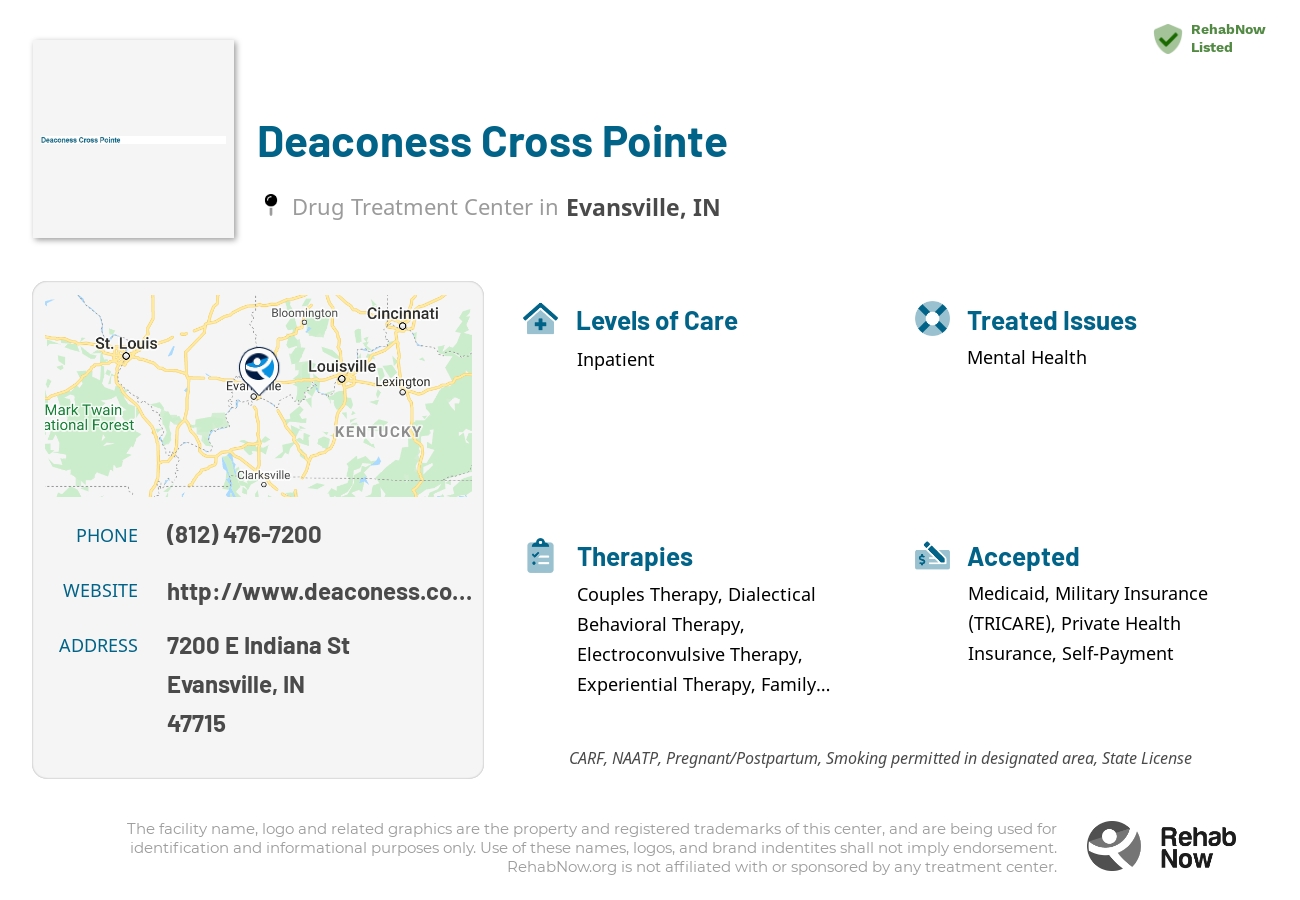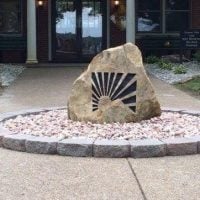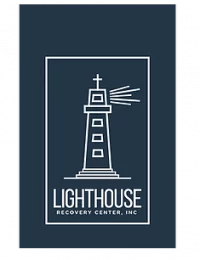Deaconess Cross Pointe
Drug Rehab Center in Evansville, Indiana
Deaconess Cross Pointe in Evansville, Indiana offers personalized and holistic addiction treatment plans, including evidence-based therapies, spiritual care counseling, 12-Step facilitation, and family and community integration, as well as dual diagnosis treatment and access to quality care programs.
About Deaconess Cross Pointe in Indiana
Deaconess Cross Pointe is a state-of-the-art addiction treatment center located in Evansville, Indiana. This well-respected facility offers individuals struggling with addiction and substance abuse the opportunity to receive personalized treatment plans, as well as support from certified professionals. Their holistic approach to recovery includes evidence-based therapies, spiritual care counseling, and 12-Step facilitation to help clients take on their addiction from both the physical and emotional aspects.
At Deaconess Cross Pointe, individuals can participate in comprehensive services such as medication management, individual and group counseling, relapse prevention strategies, and educational classes. This center also focuses on integrating family and community supports into their treatments, allowing for improved connections and healthier relationships. Additionally, dual diagnosis treatment is available to support those individuals with a combination of addiction and mental health issues.
Deaconess Cross Pointe is accredited by the Joint Commission and licensed by the Indiana Division of Mental Health and Addiction and holds recognitions from the Indiana Governor’s Council on Impaired and Dangerous Driving. This facility also provides access to quality care programs, such as the creative arts therapies program, supervised living home, and life skills training program which allow clients to apply their acquired skills for better self-regulation and improved coping skills.
Genders
Ages
Modality
Additional
Conditions and Issues Treated
Levels of Care Offered
This center offers a variety of custom treatment tailored to individual recovery. Currently available are Inpatient, with additional therapies available as listed below.
Individuals who are suffering from severe addiction or have a high risk for dangerous health concerns are often recommended to receive inpatient treatment.
Choosing to enter an inpatient treatment program is beneficial for people who are suffering from severe addiction, or who have a high risk for dangerous health concerns.
Inpatient treatment is beneficial for:
- People who have a history of severe withdrawal.
- People who have attempted to overcome addiction on their own without success.
- People who have a history of relapse, or have recently relapsed.
- People at risk for drug overdose or withdrawal-related complications.
- People with medical conditions that are worsened by drug or alcohol use.
Therapies & Programs
Individual therapy involves one-on-one sessions between the patient and therapist. It provides patients with a safe environment to openly discuss personal and sensitive issues with the therapist. They find the therapist as someone they can trust. Individual therapy aims to identify the core issues that would have led the patient to substance abuse and address them effectively. The therapist can develop patient-specific customized solutions through individual therapy, which aids speedier recovery.
Couples therapy works with clients and significant others in a professional capacity to improve relationship dynamics. This can be helpful for addicts who are trying to marry the idea of recovery into their work, family, social lives – any aspect that has to do with relationships.
Through counseling sessions, addicts will have an opportunity to talk about their addiction with professional partners. These partners can offer feedback and advice on how to get sober while keeping healthy relationships intact. A good couples therapist will help addicts understand their part in an unhealthy relationship dynamic or find ways to deal with anger or resentment from significant others outside of the home.
Family therapy is a group problem-solving that aims to improve communication and relationships between the addict, their family, and sometimes friends. The main goal of family therapy for drug addiction is to create an environment where communication can occur without judgment, hostility, or blame. The therapist is with the family as they learn to communicate differently, especially with the addict when s/he is using. The family can learn to reduce their enabling behavior or rally together and support each other during tough times.
An addict’s family can play a vital part in helping them to avoid relapse because they can spot the warning signs and help them get back on track before it becomes too much of a problem. Family therapy is one of the most effective ways to help addicts stay on the path to long-term sobriety. When a drug addict decides that they want to try and get sober, it takes the support of every person they love to succeed. It can be incredibly difficult for loved ones to watch an addict go through the pain and suffering of withdrawal, but by being there with them and supporting them, they can help to make sure that the addiction never returns.
Groups typically involve meetings with other recovering addicts who can relate to one another’s experiences. They might meet in person or online and typically focus on the process of staying sober rather than overcoming a specific addiction.
In these groups managed by Deaconess Cross Pointe, addicts can build a sense of community and develop strong emotional connections with others who understand what they are going through. These beneficial relationships can help addicts overcome their cravings and prevent relapse at any point during the recovery process.
Dialectical Behavior Therapy (DBT) is a type of therapy created in the late 1980s and early 1990s to help people with high rates of suicidal behavior. DBT helps people learn how to live a life that is no longer controlled by overwhelming emotions and urges. It is beneficial in treating drug addiction because it helps patients understand and cope with their cravings for drugs or alcohol rather than turning to those substances as a way of coping.
There is hope for people who are addicted to drugs and alcohol. Cognitive Behavioral Therapy (CBT) is the solution. CBT focuses on the underlying thoughts and behaviors that caused the addiction problem in the first place and may cause a relapse. This type of psychotherapy addresses negative feelings common in substance abuse disorders. It helps to change them by restructuring thought patterns. It’s about removing negative thoughts and providing long-term benefits while promoting self-awareness, self-control, and healthy ways to respond to negative thoughts. These sessions can be done by themselves or as part of combination therapy.
Patient Experience
Experiential Therapy at Deaconess Cross Pointe
Experiential Therapy teaches people how to think differently about their lives and change their emotions by changing their behavior. This type of treatment is accomplished with various activities that may involve acting, props, arts and crafts, animal care, or other tools that may be effective.
This therapy aims for patients to release suppressed thoughts that cause bad feelings and drug addiction. Role-playing, arts and crafts, music, animal care, rock climbing, etc., are some of the activities used in this therapy. Gradually an individual will feel calmer and more loving which will change their perception positively. In addition to treating drug addiction, experiential therapy is beneficial for different behavioral and eating disorders.
Payment Options Accepted
For specific insurance or payment methods please contact us.
Is your insurance accepted?
Ask an expert, call (888) 674-0062
Additional Details
Specifics, location, and helpful extra information.
Evansville, Indiana 47715 Phone Number(812) 476-7200 Meta DetailsUpdated November 25, 2023
Staff Verified
Deaconess Cross Pointe Patient Reviews
There are no reviews yet. Be the first one to write one.
Evansville, Indiana Addiction Information
The state of Indiana ranks 14th in the nation for drug abuse, but 17th for drug overdoses. The state has many high-quality rehabilitation centers, but reports show that there are about 20 deaths per 100,000 people. This is due to its location making it a drug trafficking haven, where many drugs are further distributed into the country.
The drug addiction problem in Evansville, IN, is unfortunately quite severe. According to statistics, there were over 1,000 emergency room visits related to drug overdoses in Evansville alone. Cocaine is the most commonly abused drug. Businesses may suffer from decreased productivity and an increase in absenteeism. If you or someone you know is struggling with drug addiction and abuse, drug treatment facilities can provide the help you need to get sober.
Treatment in Nearby Cities
- Lebanon, IN (152.8 mi.)
- Sullivan, IN (77.3 mi.)
- Kouts, IN (232.1 mi.)
- Crawfordsville, IN (146.1 mi.)
- Portage, IN (249.3 mi.)
Centers near Deaconess Cross Pointe
The facility name, logo and brand are the property and registered trademarks of Deaconess Cross Pointe, and are being used for identification and informational purposes only. Use of these names, logos and brands shall not imply endorsement. RehabNow.org is not affiliated with or sponsored by Deaconess Cross Pointe.





